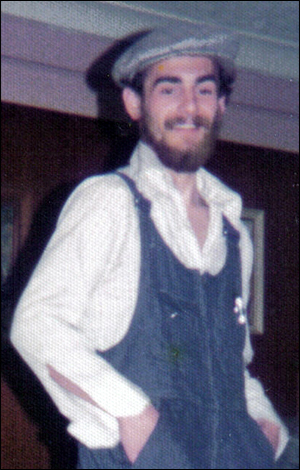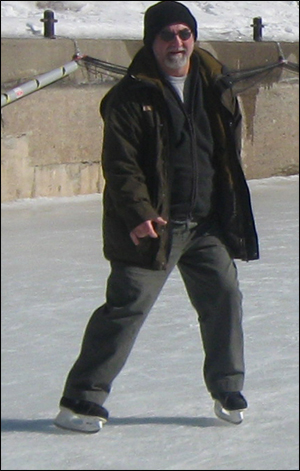| HOME | ABOUT THE AUTHOR | THE BOOKS | REVIEWS |
Don Deveau: About the Author
As a child of the 1950s and 1960s, growing up in rural Nova Scotia, life was good. It held everything that a child needed for a life of wonder, requiring only the element of imagination. We were the first TV generation, but we were in no way dominated by it;  the idiot box was little more than a novelty and relatively harmless back then. Our days were spent roving the neighbourhood and inventing entertainments. As kids we all had the same middle name: "Get-out-and-play." And that’s just what we did, from sunup till sundown. Our heroes came from comic books and Saturday matinees. The only thing dangerous about our neighbourhood was getting caught shirking chores by your grandmother, or by anyone’s grandmother, they were all the same. They would feed you homemade bread or cookies or chase you with a broom if they thought you deserved either. And they were almost always right.
the idiot box was little more than a novelty and relatively harmless back then. Our days were spent roving the neighbourhood and inventing entertainments. As kids we all had the same middle name: "Get-out-and-play." And that’s just what we did, from sunup till sundown. Our heroes came from comic books and Saturday matinees. The only thing dangerous about our neighbourhood was getting caught shirking chores by your grandmother, or by anyone’s grandmother, they were all the same. They would feed you homemade bread or cookies or chase you with a broom if they thought you deserved either. And they were almost always right.
We played pickup hockey in the winter on just about any piece of water that allowed its molecules to glaze over and solidify long enough to hold our weight.
Such a game could last for most of a day, with players fading in or out as they got tired or hungry and fresh legs arrived. Little attempt was made to keep track of the score, especially after the first 15 or 20 goals. By suppertime, nearly weak with hunger and exhaustion, the game would come to an end, as natural as any organism running down and getting low on energy. It was just the organic engine that beat the rhythm of the hearts and stomachs and blood of a bunch of rag-tag young boys who owed their utter exhaustion to serving no master but the god of Play. Besides, it was getting too dark to see the puck anyway.
When the Sixties blew into our small town, warnings about "Reefer Madness" were disseminated by officialdom, and in their wisdom, school authorities introduced sex ed. For us boys, this consisted of a 40 minute instructional lecture about gonads, hormones and the dangerous and inevitable horrible consequences of their volatile mix. Apparently, upon reaching puberty, we were all doomed. Shame, venereal disease and of course the shame of venereal disease awaited us within the folds of every skirt we even thought about lifting. Of course the ONLY thing we were interested in was what those skirts might be concealing! It was no use pointing out that perhaps a condom might provide a simple form of protection from such a disaster. We were all Catholic. I have no idea what kind of instructions the girls were receiving, since they were given separate attention, cloistered in a separate classroom. For all we knew, they were probably being supplied with chastity belts, mace and holy water to ward off the likes of us boys, painted vividly by their instructor as vile horned beasts, akin to werewolves, vampires and of course Satan.
They could have all saved their breath. Our mothers or our grannies had already given us the lecture about keeping it in our pants, as well as other practical advice regarding avoiding the pitfalls of having it fall off or of going blind. Not only that, those Catholic girls weren’t about to give us the time of day anyway.  They had somehow found out about Protestant boys, who were all much better versed in the ways of love and loving, and who never left home without a condom in their wallets. Sinful bunch, those Protestants. However, if they were all busy with our Catholic girls, well, who was wooing all those lonely Protestant girls? Hmmm...
They had somehow found out about Protestant boys, who were all much better versed in the ways of love and loving, and who never left home without a condom in their wallets. Sinful bunch, those Protestants. However, if they were all busy with our Catholic girls, well, who was wooing all those lonely Protestant girls? Hmmm...
In February 1964 Ed Sullivan introduced The Beatles to an unsuspecting North American public and all hell broke loose. And it wasn’t even the music that was the real issue. Most adults simply shrugged that off as a passing phase. The real issue was a thing of such grave consequence and so vile that it tore apart families, made grown men cry and threatened to destroy the very fabric of society. In all of its sinister deviance, considered as the cause for every vile thing from simple moral depravity to the collapse of civilization, the one thing that The Beatles could not be forgiven was their HAIR.
It seemed that overnight an entire generation turned into freaks. It became easy to make grown men cry. All you had to do was hitchhike home and show up on your father’s doorstep after a few months away at college, wearing torn jeans or bellbottoms, dirty feet in sandals and, of course, hair down to there. My grandfather surprised me, pointing out a certain similarity to Jesus. I didn’t know whether I should have thanked Jesus for Gramps or thanked Gramps for Jesus.
From clean cut to hippie freak, the 1970s were shaping up to be an interesting time of changes. Despite the great scare campaign about Reefer Madness, like many a teenager in the early Seventies, I tuned in, turned on and dropped out. Years later, when my kids would insist on an answer, I would admit to trying drugs only once – it lasted for about seven years, if memory serves me right. Okay, I exaggerate, there’s no way my memory is anywhere near accurate.
From first kiss to first toke, from diamonds in the rough to stone cold broke, it didn’t matter. It was a great time to be alive. The music alone was worth the trip, and tripping with Jimi Hendrix or trucking with the Grateful Dead was an experience never to be repeated – except as deja vu, of course. One hit and we knew without a doubt that we had all been here before. One too many hits and there would be just no coming back. For example, no one has heard from Jack Mack since 1971. He was last seen sitting on a curb on John Street, or rather levitating slightly above the pavement, he was so high.
In the middle of a record breaking February deep freeze, Harold G. pressed a cold, tin-foil-wrapped quarter ounce of Afghanistan Blond into my hand for safe keeping while he was away. He was planning a "business trip" to the city for a few days.  A quarter ounce of pure, uncut hashish... "Sure, man, it’ll be safe with me."
A quarter ounce of pure, uncut hashish... "Sure, man, it’ll be safe with me."
When I saw him again it was summer and just in time to help out in the drug crisis center complete with suicide hotline, a project that was part of a drop-in center for teens. That was the summer of 1973. When that phone rang at night – once we were able to identify the sound as coming from our phone and we realized that, Oh god, it was actually ringing, and what do we do now – well, if we were not too far gone in the grip of a body stone to move and answer it – the night got interesting. I’m not sure if Cheech and Chong could have done better.
Although I am much older now, I still find inspiration from my formative years. Despite the turbulence and upheaval of the sixties and seventies, I feel lucky to remember that era as my time for coming of age. It has been a consistent source and influence for me throughout my writing projects. I have been writing for as long as I can remember. My first novel, A Time for Charity, is a coming of age story set in the late 1960s. You are welcome to read a sample of it here.